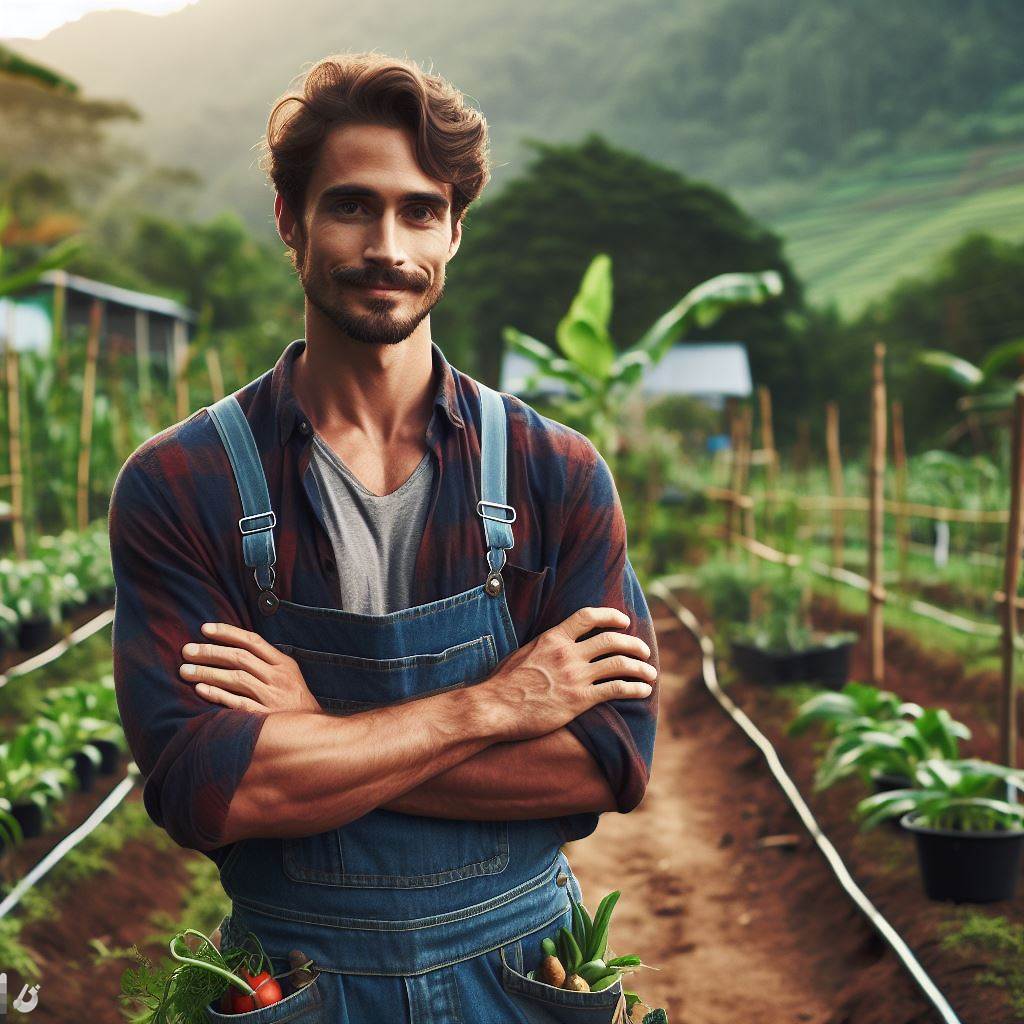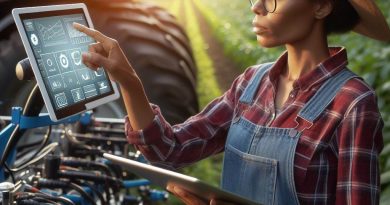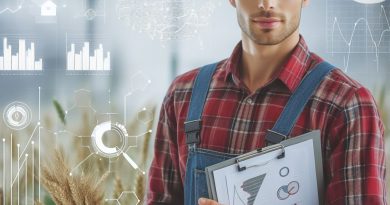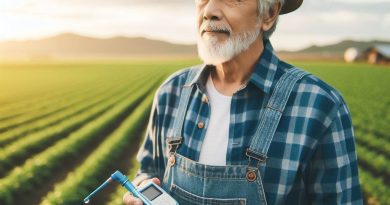Sustainable Farming via Tech Innovations
Last Updated on January 18, 2024
Introduction
The concept of sustainable farming
Sustainable farming is an approach that aims to minimize environmental impact while maximizing productivity.
Technology plays a vital role in driving sustainable farming practices forward.
Sustainable farming involves using methods that maintain soil health, conserve water, and reduce the use of harmful inputs.
Importance of technology in driving sustainable farming practices
Technology offers valuable tools that enable farmers to monitor and manage their resources more effectively.
The use of sensors and data analytics helps farmers make informed decisions about irrigation, fertilizer application, and pest management.
Precision agriculture technologies, such as GPS and drones, enable farmers to optimize their field operations, resulting in improved yields and reduced waste.
Farmers can also adopt innovative practices like vertical farming, hydroponics, and aquaponics, which rely heavily on technology for optimal production.
Advanced greenhouse systems with automated climate control ensure optimal conditions for crop growth and minimize energy usage.
Furthermore, technology enables farmers to collect and analyze data, helping them identify areas in need of improvement and implement sustainable solutions.
By embracing technology, farmers can enhance efficiency, reduce waste, and improve the overall sustainability of their operations.
Basically, sustainable farming relies on technology to drive innovation and improve agricultural practices.
By integrating technology into farming, we can create a more sustainable and environmentally-friendly food production system.
Benefits of Sustainable Farming
Sustainable farming is not only beneficial for the environment but also brings numerous advantages to farmers and society as a whole.
By implementing innovative technologies and practices, this farming approach aims to meet current needs without compromising the ability of future generations to meet their own.
Environmental Benefits of Sustainable Farming
Reduced carbon emissions
One of the primary environmental benefits of sustainable farming is the reduced carbon emissions.
Traditional farming techniques heavily rely on fossil fuels for machinery, transportation, and synthetic inputs.
In contrast, sustainable farming minimizes the use of these non-renewable resources, leading to lower carbon emissions and mitigating climate change.
Preservation of natural resources
Furthermore, sustainable farming plays a vital role in preserving natural resources.
For instance, the adoption of water conservation methods, such as drip irrigation, reduces water wastage.
The use of organic fertilizers and integrated pest management techniques also prevents soil degradation and contamination, ensuring long-term soil health.
By maintaining the quality of soil, water, and air, sustainable farming contributes to the overall health of ecosystems.
Promotion of Biodiversity and Protection of Ecosystems
Another significant advantage of sustainable farming is the promotion of biodiversity and protection of ecosystems.
Conventional agricultural practices often lead to monocultures, where only one or a few genetically modified crops dominate.
In contrast, sustainable farming encourages crop diversity, which enhances the resilience of farming systems against pests, diseases, and climate variability.
Additionally, sustainable practices like agroforestry and the creation of wildlife habitats contribute to the conservation of plant and animal species, thus enhancing overall biodiversity.
Potential Economic Advantages of Sustainable Farming
Cost savings
Apart from the environmental benefits, sustainable farming also offers potential economic advantages.
While the initial transition to sustainable practices might require investment, in the long run, it can lead to cost savings.
By reducing the dependence on synthetic chemical inputs and pesticides, farmers can save on purchasing these expensive inputs.
Adoption of energy-efficient technologies like solar-powered machinery can further reduce costs.
Improved soil health
Moreover, sustainable farming improves soil health through practices like crop rotation, cover cropping, and organic fertilization.
Healthy soils support vigorous crop growth, leading to higher yields and reduced expenses for farmers.
Additionally, by minimizing soil erosion and preserving its nutrient content, sustainable farming reduces the need for costly soil amendments.
Generally, sustainable farming brings numerous environmental, biodiversity, and economic benefits.
By reducing carbon emissions, preserving natural resources, promoting biodiversity, and improving soil health, this approach ensures the sustainability of our agricultural systems.
Furthermore, the potential cost savings and economic advantages make sustainable farming a viable option for farmers, fostering a healthier and more sustainable food production system for the future.
Read: Solar-Powered Irrigation: A Deep Dive
Role of Technology in Sustainable Farming
Technology has transformed farming practices, leading to sustainable and efficient methods that benefit farmers and the environment.
With the advent of precision agriculture techniques, smart farming technologies, automation, robotics, data analytics, and artificial intelligence, farmers can optimize their operations and achieve higher yields while reducing resources.
Let’s explore how technology has revolutionized sustainable farming.
Revolutionizing Farming Practices
Technology has brought significant advancements to farming practices, making them more efficient, sustainable, and environmentally friendly.
Through the use of innovative tools and equipment, farmers can minimize waste, reduce water and energy consumption, and decrease the environmental impact.
Precision Agriculture Techniques and Smart Farming Technologies
Precision agriculture techniques, such as GPS, remote sensing, and data analysis, allow farmers to optimize the use of inputs like water, fertilizers, and pesticides.
These technologies provide real-time data on soil moisture, nutrient levels, and crop health, enabling farmers to make informed decisions and apply resources precisely where and when needed.
Smart farming technologies, including sensors, drones, and Internet of Things (IoT) devices, take precision agriculture a step further.
These technologies collect data on temperature, humidity, light, and soil conditions, providing farmers with valuable insights into crop growth patterns and potential issues.
Armed with this information, farmers can prevent diseases, pests, and other threats, reducing the need for chemical interventions.
Automation and Robotics in Sustainable Farming
The role of automation and robotics in sustainable farming practices cannot be overlooked.
Automated systems can handle repetitive tasks, such as seeding, watering, and harvesting, with precision and efficiency.
This reduces the labor required and enables farmers to allocate their resources more effectively.
Robotics also plays a vital role in tasks that require delicate handling, like fruit picking and pruning.
Robots equipped with advanced imaging and AI algorithms identify ripe produce and execute precise movements, minimizing waste and increasing overall efficiency.
Importance of Data Analytics and Artificial Intelligence
Data analytics and artificial intelligence (AI) are invaluable tools for optimizing farming operations.
By analyzing extensive data sets collected from various sources, including sensors, drones, and historical records, farmers can uncover patterns and trends that help them make better decisions.
AI algorithms can process vast amounts of data quickly and accurately, providing farmers with predictive models for weather conditions, crop yields, and market demands.
This enables farmers to adjust their strategies accordingly, ensuring maximum productivity and profitability.
In addition, AI-powered machinery and equipment can autonomously adapt to changing conditions, enhancing resource allocation, and reducing waste.
For example, irrigation systems equipped with AI algorithms can precisely control water usage based on real-time weather and soil data, conserving water resources while maintaining optimal crop conditions.
Essentially, the role of technology in sustainable farming cannot be overstated.
Precision agriculture techniques, smart farming technologies, automation, robotics, data analytics, and artificial intelligence have transformed farming practices, allowing farmers to optimize resource allocation, reduce environmental impact, and achieve higher yields.
Embracing technology in agriculture is essential for ensuring a sustainable and productive future.
Read: Agri Robots: The Future of Farming Now
Tech Innovations in Sustainable Farming
In recent years, the agricultural industry has witnessed a revolutionary change due to technological advancements.
From drones and satellite imaging to sensors and Internet of Things (IoT) devices, these tech innovations have made sustainable farming a reality.
Drones and Satellite Imaging for Crop Monitoring and Management
One of the most significant contributions of technology to sustainable farming is the use of drones and satellite imaging for crop monitoring and management.
These tools provide farmers with real-time data and insights about their fields.
- Drones equipped with cameras and sensors can capture high-resolution images of crops, helping identify early signs of diseases or nutrient deficiencies.
- Satellite imaging, on the other hand, offers a bird’s-eye view of large agricultural areas, allowing farmers to assess crop health and detect anomalies on a much broader scale.
By using drones and satellite data, farmers can take timely action to address issues, leading to improved crop productivity and reduced resource wastage.
The Benefits of Sensors and Internet of Things (IoT) Devices in Precision Agriculture
Sensors and IoT devices have revolutionized precision agriculture, offering numerous benefits to farmers:
- Sensors embedded in the soil can measure moisture levels, temperature, and nutrient content, providing farmers with accurate information for irrigation and fertilization.
- IoT devices enable real-time monitoring of environmental conditions and crop growth parameters, allowing farmers to optimize resource allocation and adjust farming practices accordingly.
- By collecting and analyzing data from these devices, farmers can make data-driven decisions, reduce resource inputs, enhance crop quality, and minimize environmental impact.
The Potential of Vertical Farming and Hydroponics in Sustainable Farming
Vertical farming and hydroponics are gaining popularity as innovative methods of sustainable farming:
- Vertical farming maximizes space utilization by growing plants in stacked layers, indoors or in controlled environments.
This technique reduces land requirements and allows year-round production, independent of weather conditions. - Hydroponics eliminates the need for soil, as plants are grown in nutrient-rich water solutions.
This method conserves water, minimizes pesticide use, and enables precise control over nutrient supply, resulting in higher yields and reduced environmental impact.
Vertical farming and hydroponics offer the potential for sustainable agriculture in urban and arid areas, reducing the dependence on traditional farmland.
The Role of Gene Editing Technologies and Biotechnology in Sustainable Crop Varieties
Advancements in gene editing technologies and biotechnology have opened new avenues for developing sustainable crop varieties:
- Gene editing allows scientists to precisely modify plant genomes, enhancing traits such as drought resistance, disease tolerance, and nutrient content.
- Biotechnology enables the development of genetically modified crops that are resistant to pests, reducing the need for chemical pesticides and minimizing environmental harm.
By harnessing these technologies, researchers can create crops that require fewer resources, yield higher outputs, and withstand adverse environmental conditions.
In general, tech innovations have revolutionized sustainable farming.
From drones and satellite imaging to sensors, IoT devices, vertical farming, hydroponics, gene editing, and biotechnology, these advancements offer immense potential to improve crop management, conserve resources, and mitigate environmental impact.
Embracing these technologies is crucial for a sustainable and food-secure future.
Read: Next-Gen Drip Irrigation: What’s New?

Challenges and Limitations
Implementing tech innovations in sustainable farming comes with its fair share of challenges and limitations.
Addressing these obstacles is crucial for the successful integration of technology in the agricultural sector.
Proper Training and Education
One major challenge is the need for proper training and education to ensure farmers have the necessary skills to use farming technologies effectively.
Without proper training, these innovations may not achieve their intended goals.
High Initial Investment Costs
Another limitation is the potential high initial investment costs associated with adopting sustainable farming technologies.
These technologies often require substantial financial resources to implement and maintain.
Lack of Awareness and Knowledge
Many farmers may not be aware of the available tech innovations or have a sufficient understanding of their benefits.
This lack of awareness can be a significant barrier to the successful adoption of technology in sustainable farming.
Limited Access to Technology
Access to technology can be a challenge, especially for small-scale farmers in remote areas.
Limited access to reliable internet connections and necessary equipment can hinder the implementation of tech innovations.
Resistance to Change
Resistance to change is a common challenge when introducing new technologies.
Farmers may be skeptical or resistant to deviate from traditional farming methods, thereby hindering the adoption of sustainable farming technologies.
Data Management and Privacy Concerns
The integration of technology often involves data collection and analysis.
Ensuring proper data management practices and addressing privacy concerns are vital to maintain farmer trust and facilitate the widespread adoption of tech innovations.
Compatibility and Interoperability
Different technologies may not be compatible or interoperable with existing farming systems.
This lack of compatibility can pose challenges when integrating multiple technologies or transitioning from conventional to sustainable farming methods.
Limited Technical Support
Effective technical support is crucial for farmers adopting new technologies.
However, the availability and accessibility of support services may be limited, particularly in rural areas.
Environmental Considerations
Implementing tech innovations should not overlook potential negative environmental impacts.
It is important to assess the sustainability of these technologies and ensure they contribute to long-term environmental conservation.
Despite these challenges and limitations, it is essential to recognize the potential benefits that tech innovations can bring to sustainable farming.
Properly addressing these obstacles through targeted interventions and support can pave the way for a more efficient and productive agricultural sector.
Read: Smart Sensors: Changing Farm Water Use
Success Stories and Case Studies
Specific farms or organizations that have achieved sustainable farming practices through the use of technology
One success story of sustainable farming through tech innovations is the use of vertical farming.
AeroFarms
A specific farm that has implemented this technology is AeroFarms.
They utilize vertical stacks to grow crops in a controlled environment.
The positive outcome of this implementation is the ability to produce more food in a smaller space, reducing the need for land.
Another successful case is the use of precision agriculture technology, which involves using sensors and drones to monitor and manage crops.
John Deere
John Deere, a well-known organization in the agriculture industry, has achieved sustainable farming practices through the use of precision agriculture.
This technology enables farmers to optimize the use of resources such as water and fertilizers, resulting in higher yields and reduced environmental impact.
Furthermore, the Internet of Things (IoT) has revolutionized sustainable farming practices.
Croptimal
Farms like Croptimal have utilized IoT to monitor soil conditions, climate, and even livestock health.
This data-driven approach allows farmers to make informed decisions, leading to improved efficiency and sustainability.
Another example is the use of robotics in farming operations.
Iron Ox
Farmers like Iron Ox have successfully integrated robots into their farms to automate tasks such as planting, harvesting, and monitoring.
The positive outcome of this innovation is the reduction in manual labor and increased productivity.
Moreover, aquaponics, the combination of aquaculture and hydroponics, has shown great success.
Green Sense Farms
Organizations like Green Sense Farms have implemented this technology to grow fish and plants in a symbiotic system.
The result is a highly efficient and sustainable farming method that maximizes yields and minimizes water usage.
In addition, the adoption of renewable energy in farming has yielded positive outcomes.
Blue River Technology
Farms like Blue River Technology have integrated solar power to fuel their operations, reducing reliance on fossil fuels.
This not only reduces greenhouse gas emissions but also lowers energy costs for farmers.
Lastly, the use of biotechnology has led to successful sustainable farming practices.
Examples include genetically modified crops that are resistant to pests or drought, allowing farmers to produce more with fewer resources.
Monsanto
Monsanto, a prominent organization in biotechnology, has contributed to sustainable farming through its innovative seed technologies.
In essence, there are numerous success stories and case studies of sustainable farming via tech innovations.
Vertical farming, precision agriculture, IoT, robotics, aquaponics, renewable energy, and biotechnology are all examples of these successful implementations.
These advancements have resulted in positive outcomes such as increased productivity, resource optimization, and environmental sustainability.
It is clear that technology plays a crucial role in shaping the future of sustainable farming.
Conclusion
Key points discussed in the blog post
We have discussed several key points regarding sustainable farming through tech innovations.
We have explored how technology has revolutionized various aspects of farming, including precision agriculture, smart irrigation, and livestock monitoring.
The integration of advanced sensors, AI, and data analysis has enabled farmers to minimize resource waste, increase yield, and reduce environmental impact.
The crucial role of technology in achieving sustainable farming practices
The crucial role of technology in achieving sustainable farming practices cannot be overstated.
It has not only enhanced efficiency but also improved the overall productivity and profitability of the farming industry.
By adopting these tech innovations, farmers can optimize resource allocation, conserve water, minimize chemical usage, and promote biodiversity.
This not only benefits the environment but also ensures long-term food security.
Encouragement for further exploration and adoption of tech innovations in the farming industry
To further accelerate sustainable farming practices, it is essential for more stakeholders to explore and adopt these tech innovations.
Governments should provide incentives and support, while researchers should continue to develop and improve these technologies.
Farmers should be encouraged to embrace and integrate technological solutions into their operations for increased efficiency and sustainability.
In a nutshell, technology is the driving force behind sustainable farming practices.
It has the potential to revolutionize agriculture, mitigating the challenges posed by climate change, population growth, and limited resources.
By embracing and investing in tech innovations, we can create a future of smart and sustainable farming, ensuring food security for generations to come.


